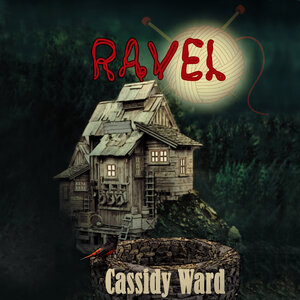Ravel by Cassidy Ward is a novella that is part poetry, part coming of age, and part fantasy adventure. It stars Dennis, a young man coming home, Carol Ann, a young girl who grows into her own magic, and Nana Baker, grandmother extraordinaire. In this world, knitting isn’t just making clothes or scarfs, but powerful magic that keeps the world safe.
The majority of this novella takes place in the past as Carol Ann observes the youth of Nana Baker, and the night she lost her own grandmother. She learns from Nana Baker, and it allows her to save both herself and Dennis from the shadow creatures whose only purpose is to unravel the world.
Creation and destruction are closely woven themes in Ward’s story. The pinnacle of the plot occurs when Nana Baker, as a child, realizes she does not want to unravel the creatures terrorizing their world, that she wants to create something instead. So she knits a shape that shines brilliant light in the darkness. In the same way, Carol Ann defeats her own monster not by killing it, but by planting a simple seed of corn.
Destruction is everywhere in today’s world, seen even more clearly as the pandemic continues on. Now, more than ever, its important to remember that destruction of the things and systems that hurt us is only part of the answer, that this must be paired with building people up, creating in ourselves the people we want to be the, crafting a world in which we want to live.
Ravel strongly reminded me of that.
One of the things I also enjoyed while reading Ravel was how frequently sewing imagery was used. Its very appropriate considering the plot and themes, but delighted me anyway.
My only criticism is that Carol Ann and Nana Baker were far more interesting than Dennis. Especially during Nana Baker’s flashback, I kept wondering why readers had been introduced to this fantastic world through him. That said, there’s a particular scene where Dennis accidentally says something hurtful to Carol Ann, who runs away out of hurt. Dennis’ mother begins to yell at him. The way that Ward described Dennis’ disassociation through shame during the scolding reminded me of moments in my own childhood. Then comes Nana Baker, parenting in a way I think a lot of kids wish they could have been parented:
“You work the threads of the world wherever you go, Dennis. Every act you undertake either lays them down or pulls them up. Sometimes they’re just little threads, thing at the edges that won’t be missed. Tonight you pulled a thread, and not a little one. I don’t think you meant to. I think you stumbled down a hallway and caught yourself on a nail when you weren’t looking. But the thread is pulled nonetheless and if you don’t fix it, you’ll ruin something I don’t think you want ruined. That about right?”
This is not shame based parenting. It acknowledges both Dennis and Carol Ann, while affirming that Dennis needs to take action to heal the hurt. Having Dennis be our introduction into the story is an acceptable price for this beautiful scene.
Also the use of “nail” here was great foreshadowing of the nothing monsters beyond the Skein, who are called Nails by Nana Baker and her family.
Each person can choose to ravel or unravel. We can be the monster, we can be the hero.
Overall, Ravel is a very enjoyable afternoon read. Don’t miss out! The sequel comes in 2022. You can buy directly from the publisher or from Amazon.
Disclosure statement: Cassidy Ward is an editor for Big Shiny Robot!
